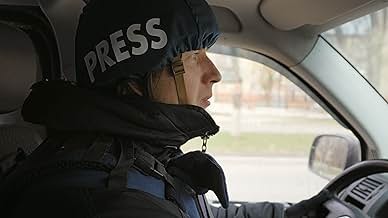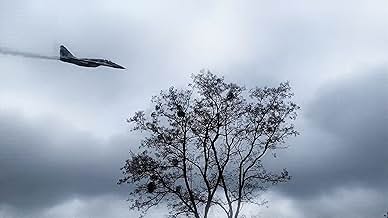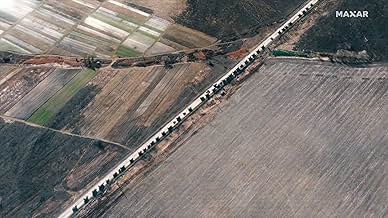Alors que l'invasion russe commence, une équipe de journalistes ukrainiens piégés dans la ville assiégée de Mariupol s'efforce de continuer à documenter les atrocités de la guerre.Alors que l'invasion russe commence, une équipe de journalistes ukrainiens piégés dans la ville assiégée de Mariupol s'efforce de continuer à documenter les atrocités de la guerre.Alors que l'invasion russe commence, une équipe de journalistes ukrainiens piégés dans la ville assiégée de Mariupol s'efforce de continuer à documenter les atrocités de la guerre.
- Réalisation
- Scénario
- Casting principal
- Récompensé par 1 Oscar
- 34 victoires et 51 nominations au total
Liudmyla Amelkina
- Self - Mariupol Resident
- (as Lyudmyla Amelkina)
Roman Golovanov
- Self - Correspondent
- (images d'archives)
- …
Igor Konashenkov
- Self
- (images d'archives)
Sergey Lavrov
- Self - Minister of Foreign Affairs of Russia
- (images d'archives)
Ernest Matskyavichyus
- Self - Journalist
- (images d'archives)
Vasiliy Nebenzya
- Self - Russian Ambassador to the UN
- (images d'archives)
Volodymyr Nikulin
- Self - Police Officer
- (as Volodymyr)
Sergei Orlov
- Self - Deputy Mayor of Mariupol
- (images d'archives)
Vladimir Putin
- Self - President of Russia
- (images d'archives)
Linda Thomas-Greenfield
- Self - U.S. Ambassador to the UN
- (images d'archives)
Volodymyr Zelenskyy
- Self - President of Ukraine
- (images d'archives)
Avis à la une
10naq-1
This is a brilliant, moving, audacious documentary from an extremely talented videographer and team, and deserves at least an Emmy and, even more preferably, an Oscar, but awards are not enough for this exceptional work.
This is a rare, you-are-there experience, in which you are immersed in the Russian takeover of a city in the Ukraine, and where you feel every emotion that these poor beseighed people feel.
The documentary starts on the week of March in which the Russian oligarch Putin (not the President, which would mean that he was elected) announces to the people of Ukraine that he is about to invade the country, and within moments, actually does launch a full-scale invasion, and we watch it happen almost moment by moment. Bombs fall on Soviet-style apartment complexes at a rate of hundreds a day, and the entire landscape soon begins to resemble the aftermath of Hiroshima.
But what is most dynamic is the actual impact on the people themselves, many of whom do not know who is bombing them. Astounding. Watching children, pregnant moms, and hospital workers taking the worst beating of all is utterly depressing, but, like all medicine, needs to be taken and swallowed whole.
Overall, this documentary is one of the most heart-wrenching, devastating, tear-jerking experiences ever. You owe it to yourself to see this to get the full effect, since words can never describe how much of an impact it will have on you.
It is a shame that it would only be available on PBS, since that will alienate at least 95% of the population that needs to watch it, but if there is even a smidgen of justice left in the world, the few who see it will tell everyone they know, and hopefully, something will come from it.
Thanks to the brave filmmakers who told this shocking story.
This is a rare, you-are-there experience, in which you are immersed in the Russian takeover of a city in the Ukraine, and where you feel every emotion that these poor beseighed people feel.
The documentary starts on the week of March in which the Russian oligarch Putin (not the President, which would mean that he was elected) announces to the people of Ukraine that he is about to invade the country, and within moments, actually does launch a full-scale invasion, and we watch it happen almost moment by moment. Bombs fall on Soviet-style apartment complexes at a rate of hundreds a day, and the entire landscape soon begins to resemble the aftermath of Hiroshima.
But what is most dynamic is the actual impact on the people themselves, many of whom do not know who is bombing them. Astounding. Watching children, pregnant moms, and hospital workers taking the worst beating of all is utterly depressing, but, like all medicine, needs to be taken and swallowed whole.
Overall, this documentary is one of the most heart-wrenching, devastating, tear-jerking experiences ever. You owe it to yourself to see this to get the full effect, since words can never describe how much of an impact it will have on you.
It is a shame that it would only be available on PBS, since that will alienate at least 95% of the population that needs to watch it, but if there is even a smidgen of justice left in the world, the few who see it will tell everyone they know, and hopefully, something will come from it.
Thanks to the brave filmmakers who told this shocking story.
If you are a human being alive in 2024 and living in a civilised country, this is mandatory viewing. If your government is blocking aide to Ukraine, get on the phone to your representatives every day, make noise, donate what you can to approved organisations (Red Cross, etc), demonstrate (peacefully), wear the colours of Ukraine, and NEVER let anyone forget what is happening there.
For two years I wear a pin with the Ukraine colours every day, and strangers come to me and shake my hand, or share a "Slava Ukraini"! With me.
What is currently happening with funding from the richest countries in the world drying up for internal political reasons is the biggest sin I have witnessed in my lifetime.
Share this film with everyone you know!
For two years I wear a pin with the Ukraine colours every day, and strangers come to me and shake my hand, or share a "Slava Ukraini"! With me.
What is currently happening with funding from the richest countries in the world drying up for internal political reasons is the biggest sin I have witnessed in my lifetime.
Share this film with everyone you know!
My family moved out of Mariupol in mid-2021. We lived in between the Drama Theater and maternity hospital, across from the University. We sometimes sat outside at Coffee Racer cafe next to the hospital, drank coffee, and watched people strolling along Miru Ave.
My mother stayed behind in Mariupol. Despite the ominous warnings, nobody really expected a full-scale invasion with bombs and artillery. She lived directly across the street from hospital #2, which is where the filmmakers hid through much of the movie. In fact, her burning apartment building is the opening shot of "Day 16". The area all along Kuprina St, adjacent to the hospital and small church, sits at the very western edge of the city, which took the brunt of the attacks approaching from Crimea direction.
After surviving the initial bombings and attacks, Mom had to drink, cook, and clean herself with water from a well adjacent to shallow graves of her neighbors. Survivors chopped up furniture to burn for cooking. It was truly medieval in every way possible, and intentionally so. After 73 days trapped, she made it out by a miracle of good luck, but not before first going through Bezimmene filtration camp.
None of my family will watch this movie except me. Everything is too close and too familiar. One thing the movie does not show is how vibrant and thriving this same city had been prior to 2/24/22. It seems surreal to see your old comfortable neighborhood get intentionally destroyed on international news. To be honest, the Russians were so jealous of Mariupol that they tried to murder it. They cannot get away with this.
This is a story that absolutely needs to be seen and heard - without any sugar-coating - as painful as it may be.
My mother stayed behind in Mariupol. Despite the ominous warnings, nobody really expected a full-scale invasion with bombs and artillery. She lived directly across the street from hospital #2, which is where the filmmakers hid through much of the movie. In fact, her burning apartment building is the opening shot of "Day 16". The area all along Kuprina St, adjacent to the hospital and small church, sits at the very western edge of the city, which took the brunt of the attacks approaching from Crimea direction.
After surviving the initial bombings and attacks, Mom had to drink, cook, and clean herself with water from a well adjacent to shallow graves of her neighbors. Survivors chopped up furniture to burn for cooking. It was truly medieval in every way possible, and intentionally so. After 73 days trapped, she made it out by a miracle of good luck, but not before first going through Bezimmene filtration camp.
None of my family will watch this movie except me. Everything is too close and too familiar. One thing the movie does not show is how vibrant and thriving this same city had been prior to 2/24/22. It seems surreal to see your old comfortable neighborhood get intentionally destroyed on international news. To be honest, the Russians were so jealous of Mariupol that they tried to murder it. They cannot get away with this.
This is a story that absolutely needs to be seen and heard - without any sugar-coating - as painful as it may be.
I saw this in a well-attended cinema screening just the other day. I can't recall a film having the impact this one did. At the end credits - silence. No one said a word and slowly filtered out. Its difficult not being effected by this film, as it confronts the viewer with the sort of hard-hitting stuff that the news generally air-brushes out. Its pretty much the exact opposite of comfort viewing - this film confirms not only are things bad but they are probably a lot worse than you imagined them to be.
As the title indicates, this is a ground level view of events in the Ukrainian city of Mariupol in the first 20 days of the Russian invasion. A disembodied voice-over relates details and an ominous soundtrack magnifies certain moments but mostly, the footage speaks for itself. The basic set-up has journalist Mstyslav Chernov stay behind to film events as the horror of war escalates on a daily basis. From Chernov's position, we are put directly into the war zone and are confronted with the civilian experience. To this end, we are forced to see the terror and suffering that these innocent people are forced to endure on account of a war initiated for utterly disingenuous reasons. While this is clearly a film about the Ukrainian situation and the sheer wrongness of the Russian invasion, it also will get you thinking that it is also about war in general, as these shocking moments are happening all over our world as part of various military conflicts. We can become desensitised to this and our news reporting is often far too sanitised, allowing us to more easily disconnect. Its films like this one which approaches war in the opposite way and ensures the viewer has no easy escape.
As the title indicates, this is a ground level view of events in the Ukrainian city of Mariupol in the first 20 days of the Russian invasion. A disembodied voice-over relates details and an ominous soundtrack magnifies certain moments but mostly, the footage speaks for itself. The basic set-up has journalist Mstyslav Chernov stay behind to film events as the horror of war escalates on a daily basis. From Chernov's position, we are put directly into the war zone and are confronted with the civilian experience. To this end, we are forced to see the terror and suffering that these innocent people are forced to endure on account of a war initiated for utterly disingenuous reasons. While this is clearly a film about the Ukrainian situation and the sheer wrongness of the Russian invasion, it also will get you thinking that it is also about war in general, as these shocking moments are happening all over our world as part of various military conflicts. We can become desensitised to this and our news reporting is often far too sanitised, allowing us to more easily disconnect. Its films like this one which approaches war in the opposite way and ensures the viewer has no easy escape.
I don't usually include reviews on documentaries on this blog, but '20 Days in Mariupol' is a documentary that needs to be seen. This is current, relevant, and illustrates the horrors of war.
On February 24th, 2022 the city of Mariupol in Ukraine still looked normal. In the words of the narrator: "Wars don't start with explosions; it starts with silence." A Journalist team captures the outbreak of war, and documents how a city is reduced to ruins and rubble within just 20 days.
There are no actors here. There's no make-up, no CGI, no green/blue screen effects, no visual effects. We get to see the events unfold through the lens of a camera of men on the run fearing for their lives - raw footage. The documentary plays like a found footage sci-fi thriller, but this is real life with real people.
'20 Days in Mariupol' is harrowing to watch, and it is heartbreaking - more so because this is not fiction or fantasy. The film had me very emotional at times, so get that box of tissues before watching this. This ain't no popcorn flick; it is a hard-hitting documentary. Yes, it is depressing - as war generally is - but the world needs to see this. I'm so glad '20 Days in Mariupol' won the Oscar for Best Documentary. The film editing was also very good.
On February 24th, 2022 the city of Mariupol in Ukraine still looked normal. In the words of the narrator: "Wars don't start with explosions; it starts with silence." A Journalist team captures the outbreak of war, and documents how a city is reduced to ruins and rubble within just 20 days.
There are no actors here. There's no make-up, no CGI, no green/blue screen effects, no visual effects. We get to see the events unfold through the lens of a camera of men on the run fearing for their lives - raw footage. The documentary plays like a found footage sci-fi thriller, but this is real life with real people.
'20 Days in Mariupol' is harrowing to watch, and it is heartbreaking - more so because this is not fiction or fantasy. The film had me very emotional at times, so get that box of tissues before watching this. This ain't no popcorn flick; it is a hard-hitting documentary. Yes, it is depressing - as war generally is - but the world needs to see this. I'm so glad '20 Days in Mariupol' won the Oscar for Best Documentary. The film editing was also very good.
Le saviez-vous
- AnecdotesA photograph by Evgeniy Maloletka of the injured pregnant woman being carried from the maternity hospital, was awarded "World Press Photo of the Year" in 2023. Her name was Irina Kalinina (32 years old). Her baby, named Miron (after the word for 'peace') was stillborn, and then his mother died in half an hour.
- Citations
Self - Narrator and interviewer: When we were in the hospital, one of the doctors told me, "War is like an X-Ray. All human insides become visible. Good people become better, bad people worse".
- ConnexionsFeatured in 2024 EE BAFTA Film Awards (2024)
Meilleurs choix
Connectez-vous pour évaluer et suivre la liste de favoris afin de recevoir des recommandations personnalisées
- How long is 20 Days in Mariupol?Alimenté par Alexa
Détails
- Date de sortie
- Pays d’origine
- Sites officiels
- Langues
- Aussi connu sous le nom de
- 20 Days in Mariupol
- Lieux de tournage
- Sociétés de production
- Voir plus de crédits d'entreprise sur IMDbPro
Box-office
- Montant brut mondial
- 35 971 $US
- Durée1 heure 37 minutes
- Couleur
- Mixage
Contribuer à cette page
Suggérer une modification ou ajouter du contenu manquant
























